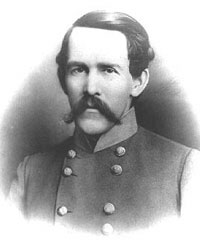Robert Emmett Rodes (1829-1864)
Robert Emmett Rodes (March 29, 1829 - September 19, 1864) was a railroad civil engineer and a promising young Confederate general in the American Civil War, killed in battle in the Shenandoah Valley.
 Rodes was born in Lynchburg, Virginia and graduated from Virginia Military Institute in 1848. He taught at VMI as an assistant professor until 1851; he left when a promotion he wanted to full professor was given instead to Thomas J. "Stonewall" Jackson, a future commander of his. Rodes used his civil engineering skills to become chief engineer for the Alabama and Chattanooga Railroad in Tuscaloosa, Alabama. He was chief engineer of the Alabama and Chattanooga Railroad until the start of the war. Although born a Virginian, he chose to serve his adopted state of Alabama.
Rodes was born in Lynchburg, Virginia and graduated from Virginia Military Institute in 1848. He taught at VMI as an assistant professor until 1851; he left when a promotion he wanted to full professor was given instead to Thomas J. "Stonewall" Jackson, a future commander of his. Rodes used his civil engineering skills to become chief engineer for the Alabama and Chattanooga Railroad in Tuscaloosa, Alabama. He was chief engineer of the Alabama and Chattanooga Railroad until the start of the war. Although born a Virginian, he chose to serve his adopted state of Alabama.
Rodes started his Confederate service as a colonel in command of the 5th Alabama Infantry regiment, in the brigade commanded by Major General Richard S. Ewell, with which he first saw combat at the First Battle of Bull Run, He was promoted to brigadier general on October 21, 1861, and commanded a brigade under Harvey Hill. In the Peninsula Campaign, Rodes was wounded in the arm at the Battle of Seven Pines and was assigned to light duty in the defenses of Richmond, Virginia while he recuperated. He recovered in time for Robert E. Lee's first invasion of the north in September, 1862, fighting at South Mountain and Antietam. At Antietam, he commanded one of two brigades that held out so long against the Union assault on the sunken road, or "Bloody Lane", at the center of the Confederate line, suffering heavy casualties. Rodes was lightly wounded by shell fragments.
In the Battle of Chancellorsville, Rodes was a division commander in Stonewall Jackson's corps. He was the only division-level commander in Lee's army who had not graduated from West Point. He was temporarily placed in command of the corps on May 2, 1863, when Jackson was mortally wounded and A.P. Hill was also wounded, but Lee quickly replaced him with the more experienced J.E.B. Stuart. Jackson on his deathbed recommended that Rodes be promoted to major general and this promotion was back-dated to be effective May 2nd.
When Lee reorganized the Army of Northern Virginia to compensate for the loss of Jackson, Rodes joined the Second Corps under Richard Ewell. In the Battle of Gettysburg, on July 1, 1863, Rodes led the assault south from Oak Hill against the right flank of the Union I Corps. Although he successfully routed the division of Maj. Gen. John C. Robinson and drove it back through the town, the attack was not as well coordinated or pursued as aggressively as his reputation would have implied. His division sat mostly idle for the remaining two days of the battle.
Rodes continued to fight with Ewell's corps through the 1864 Overland Campaign of Ulysses S. Grant. Ewell was replaced by Jubal Early and his corps was sent by Lee to the Shenandoah Valley to draw Union forces away from Petersburg, in the Valley Campaigns of 1864. They conducted a long and successful raid down the Valley, into Maryland, and reached the outskirts of Washington, D.C., before turning back. Philip Sheridan was sent by Grant to drive Early from the Valley.
On September 19, 1864, Sheridan attacked the Confederates at the Battle of Opequon, also known as the Third Battle of Winchester. Several wives of Confederate officers were chased from town during the attack and Rodes managed to save John B. Gordon's wife from capture. Rodes and Gordon prepared to attack Sheridan's forces when Rodes was struck in the back of his head by a Union shell fragment. He died on the field outside Winchester.
Rodes was mourned by the Confederacy as a promising, brave, and aggressive officer killed before he could achieve greatness. Robert E. Lee and other high-ranking officers wrote sympathetic statements. Rodes is buried in Spring Hill Cemetery, Lynchburg, Virginia.
 Rodes was born in Lynchburg, Virginia and graduated from Virginia Military Institute in 1848. He taught at VMI as an assistant professor until 1851; he left when a promotion he wanted to full professor was given instead to Thomas J. "Stonewall" Jackson, a future commander of his. Rodes used his civil engineering skills to become chief engineer for the Alabama and Chattanooga Railroad in Tuscaloosa, Alabama. He was chief engineer of the Alabama and Chattanooga Railroad until the start of the war. Although born a Virginian, he chose to serve his adopted state of Alabama.
Rodes was born in Lynchburg, Virginia and graduated from Virginia Military Institute in 1848. He taught at VMI as an assistant professor until 1851; he left when a promotion he wanted to full professor was given instead to Thomas J. "Stonewall" Jackson, a future commander of his. Rodes used his civil engineering skills to become chief engineer for the Alabama and Chattanooga Railroad in Tuscaloosa, Alabama. He was chief engineer of the Alabama and Chattanooga Railroad until the start of the war. Although born a Virginian, he chose to serve his adopted state of Alabama.